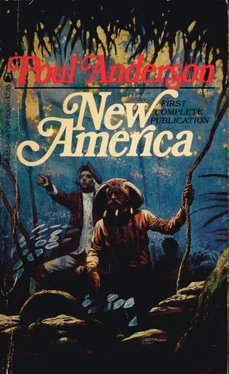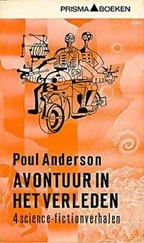De Smet filled his lungs afresh before he continued: “You see, if we gave you a subsidy, the cost of that would have to be met either through taxation or inflation. No matter which way, it’d amount to taking earnings from the highlander for the benefit of the lowlander, who gives nothing in return. Price controls would have the same effect. In fact, any kind of official intervention would distort the economy. Instead of meeting our difficulties head-on and solving them once and for all, we’d hide them behind a screen of paper, where they’d grow worse and breed new troubles to boot.
“Machinery and labor are costly because there’s a demand for them—they’re wanted, in both senses of the word—and at the same time, for the nonce, they remain scarce. In a free market, the price of a commodity is nothing more nor less than an index of how much people are prepared to exchange for it.”
“You High Americans, though”—Coffin chopped the air with his hand—”you’ve got more than your share of machines. Even per capita you do. Which means, yours is the way the money flows, no matter what we lowlanders do. It isn’t right!”
De Smet took a sip of whisky before he shook his head and sighed, “Dan, Dan, you’re a frontiersman. You know better than I, from experience, no two people ever have identical luck.
“It isn’t as if your folk were in dire want. If they were, I’d be the first to bring them relief. The free market doesn’t forbid helping your fellow man. It only makes such acts voluntary—and so in the long run, I believe, encourages altruism, though I admit that’s just my opinion.
“Your folk aren’t suffering, except in their own minds. The poorest of them eats well, dresses decently, his adequate shelter. You yourself, to judge from the pictures you’ve shown me, you live in a bigger and better house than mine, live like a medieval baron. All you lowlanders enjoy many things we don’t, such as unlimited room to move around. And… whoever can’t stand it is welcome here. We have this chronic labor shortage; he can earn excellent wages.”
“We want to be our own men,” Coffin growled, albeit not hostilely.
“I admire you for that,” de Smet said in a mild tone. “Still, recall your origins. Individuals who could live in the low country went there first to study it, paid by High America because the knowledge they could get was essential. They fell in love with the land and settled. And this was right. Mankind ought to take over the whole planet.
“That’ll be slow, however. Meanwhile, most of us are confined to the uplands. We have the same right as you to improve our standards of living, don’t we? Since you lowlanders can come join us but would rather not, why should we sacrifice to support you in your own free choice—a much freer choice than we have?
“That’s where the social utility of the supply-demand law shows itself, Dan. High America is also still young, has plenty left to do. Plenty that must be done, because we’ll be crowded long before the typical lowlander can see his neighbor’s chimney smoke. The quicker return— the effectively higher profit—to be made here, simply reflects that urgency, as well as the fact that here, today, are far more persons needing to be served.
“Please don’t take this wrong; but honestly, it looks to me as if your community is the one asking for more than is fair, not ours.”
“I told you, we don’t want a handout,” Coffin answered with somewhat strained patience. “I can prove to you that the return on any investment you make among us will be good. Okay, granted, maybe not as good as equal investment made on High America. Still, you’ll gain, and gain well.”
“We already have considerable investments in the lowlands,” de Smet pointed out. _
Coffin nodded violently. “Yes! Mines, power stations, transport lines that you own, you High Americans. You employ lowlanders to work in them, but they’re your property, and the profits go to you.”
He leaned over. His pipestem jabbed, stopping barely short of the other man’s chest. “Now let me explain some home truths,” he said. “Believe it or not, I understand your economics. I know that I’m asking, on behalf of my community, I’m asking you to use part of the stuff and staff you command, part of it to come build us—oh, that flour mill, or a factory producing machine tools, or whatever—come build that for us, instead of building something like it for High America.
“Well, I tell you, my friend, economics is not all there is to life. Rightly or wrongly, the lowlanders are starting to feel slighted. After a while they’ll come to feel neglected, and then go on to feeling exploited. I’m not saying that makes sense, but I am saying it’s true.”
“I know,” de Smet replied as if half-apologetic. “I’ve been down there myself, inside an air helmet, remember. You’re not the first lowlander I’ve talked to at length. Yes, you’re already beginning to think of yourselves as a separate breed, rough, tough, bluff frontiersmen opposed to us dandified, calculating uplanders. That notion hasn’t developed far yet-“
“It will. Unless you come help us. If you do, maybe this will stay a unified planet. Or don’t you care about your grandchildren?” Coffin waited before he added, gravely, “This is not a threat. But do bear in mind, Tom, several generations from tonight the highlanders will be an enclave. The population will nearly all be down yonder. And so will the power. Man, win their good will before it’s too late.”
“I’ve thought about that. I genuinely have. I’m aware that this isn’t a problem with any neat either-or solution. If some arrangement could be made, an economically sensible arrangement, so it’d endure…. But why should the lowlands be industrialized? In time, and not such a terribly long time, the prices of food and timber will soar, as High America fills up. Wouldn’t it be wiser to wait for that day? Meanwhile you’d keep your attractive surroundings.”
“They’re not that attractive, when we have to overwork our kids for lack of equipment we know could be built. Anyway, nobody wants to found an industrial slum. Of course not. We just want a few specific items. We’ve ample space to locate them properly, ample resources to treat the wastes so they don’t poison the land.”
“We haven’t. At least, we don’t have that kind of chance much longer, at the rate we’re going.” De Smet locked eyes with his guest and said in a voice tautened by intensity: “That’s my main reason for wanting to get rich fast. I mean to buy up as much virgin highland as possible and make a preserve of it.”
Coffin smiled in fellow feeling. De Smet’s outdoorsmanship was what had originally brought them together. It is hard not to like a man with whom you have been hiking, boating, camping for days on end.
“Maybe we can work something out,” de Smet finished. “However, it has got to involve a quid pro quo, or it’s no good. As the saying goes, a fair exchange is no robbery.”
/Lake Royal, where they planned to fish, gleamed remotely on the right. Still the car whined ahead. A ways further came a break in the forest, an ugly scar where the ground had been ripped open across several kilometers. No life save a few weeds had returned to heal it.
Coffin gestured with his pipestem. “How old is that thing, anyway?”
De Smet peered out the canopy. “Oh, the strip mine?” He grimaced. “Seventy, eighty years, I guess. From the early days.”
“Industrialization,” Coffin grunted.
De Smet stared at him. “What’re you talking about? Necessity. They had to have fuel. Their nuclear generator was broken down, couldn’t be fixed soon, and winter was coming on. Here was a surface seam of coal which they could easily quarry and airlift out.”
Читать дальше











